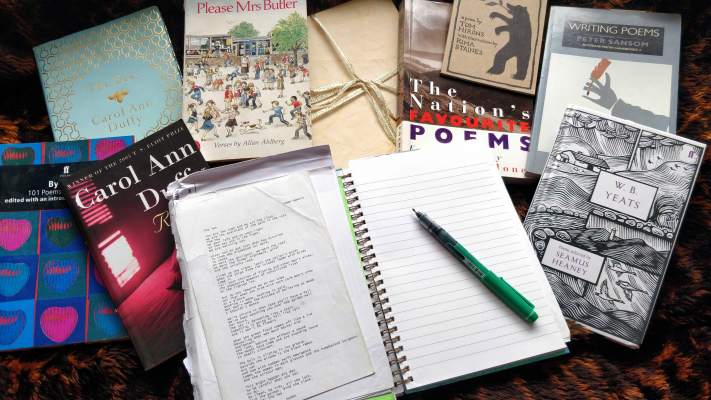
In normal life we don’t all get time for the things we mean to do, but one happier side effect of the current crisis is the number of people who’ve decided they’re going to read that book, decorate that room, or learn that skill they’ve been putting off. Paint sales are up nearly as high as sales of Joyce’s Ulysses, suggesting we’re seizing the opportunities that furlough may provide. And while we don’t for a moment want to make light of the awfulness of a pandemic, we can still enjoy people’s spirit and resolution.
One thing I never get enough time for is poetry, whether reading, writing, or remembering. But starting today, with great good timing, is #NaPoWriMo, or National Poetry Writing Month, and in its honour we’ve collated some of the poetic things going on locally.
NaPoWriMo is all about writing a poem a day throughout April, and it’s well represented in Oxford, just as its cousin NaNoWriMo (National Novel Writing Month) is every November. Oxford-based Megan of The Writer’s Greenhouse is marshalling the local Mo-ers, and offering poetry prompts every day on facebook, instagram and on her blog. These prompts offer new forms of poetry you may not have tried, and subjects to write about too. The NaPoWriMo site also offers prompts, but we find them more complicated, whereas Megan’s are quick to take in and often so short and straightforward that you can’t wait to dive in and fiddle with them straight away. While you’re on The Writer’s Greenhouse site do have a good look round – there are loads and loads of resources to help your writing, in all sorts of forms.
The Writer’s Greenhouse philosophy is that poetry is fun, and poetry is for everyone, whether you already think of yourself as A Poet or not. And if you enjoy NaPoWriMo and want to get stuck into some more poetry writing then Megan’s Meddling With Poetry course begins in May (online: remote teaching with resources sent out by post). It’s £250 for 8 weeks, and having done courses with Megan before I can safely say they are well worth the money, and you make friends for life as well as a portfolio of writing.
And if the work you produce in April and May is good enough for publication you’re just in time for Live Canon’s First Collection competition deadline of 25th May! Live Canon are dedicated to live performance of poetry, but they also run correspondence courses on specific topics, like science and poetry, or writing about the climate crisis.
Children are benefitting from a plethora of activities to banish boredom that have suddenly appeared. One of our favourites is Simon Mole's free online poetry writing workshops. Write on Tuesdays, share finished work on Thursdays. There are separate workshop sessions for 5-8s and 8-11s. When screen time is as beneficial as this, calls for it to be minimised seem to be quieting!
And what of reading poetry? The Oxford Poetry Library invite you to forgo the headlines first thing in the morning and instead wake up to poetry. Just sign up on their website, for a dose of wisdom and charm to lighten your mornings.
Many of us have a book of poetry stashed away somewhere in the house. (I’m looking guiltily at my rather dusty collection now.) But if not, there’s lots online. You can watch performance poetry from many great people on youtube or hear more classical pieces read to you at Poetry Archive whose whole collection is oral (or perhaps aural).
If you prefer the words on a page, read contemporary poetry online at The Poetry Society, and order books from Bloodaxe; or search the online collection at the National Poetry Library. The biggest collection of the classics online is The Poetry Foundation. They’re based in Chicago and certainly feature American poets heavily, but not exclusively. You can search by poet, by title, or by collection if you want to discover new poems. I spent a happy while in their Spring collection.
Whether you’re reading, writing, or counting the syllables in a haiku, poetry isn’t something that should be written off if you hated it at school, so maybe it’s time to rediscover the joys of a beautifully penned thought.
And although Sheenagh Pugh herself has deplored people reading her poem too optimistically, a snippet of Sometimes seems a good way to end:
Sometimes things don’t go, after all,
from bad to worse. Some years, muscadel
faces down frost; green thrives; the crops don’t fail.
Sometimes a man aims high, and all goes well.



